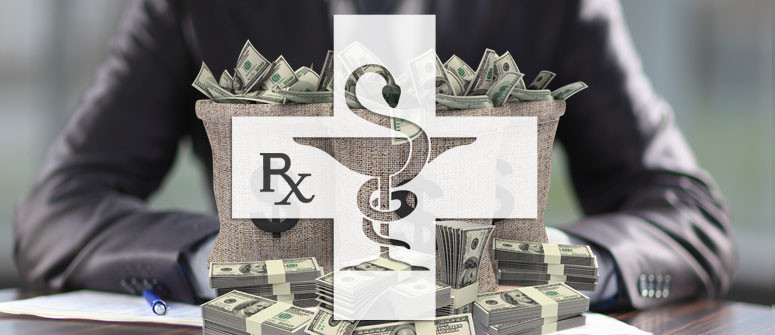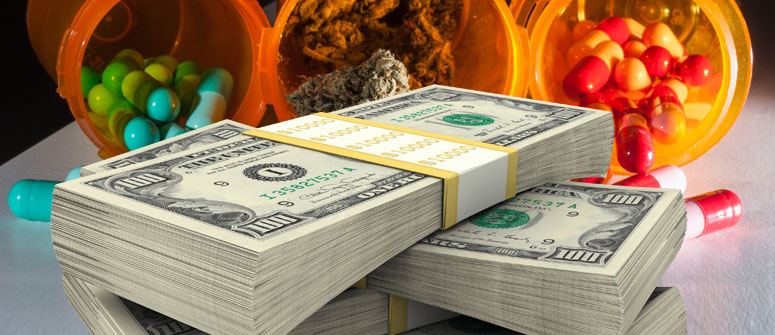Behind the anti-pot movement

Funding for anti-marijuana campaigns and institutions has caused a heated debate. Check out what the story's all about, and how Big Pharma plays a major part in the discussion.
The marijuana legalization movement is gaining traction, and legalization is expanding into more states throughout the US. European marijuana laws are also becoming more lenient, with greater legalization measures passing annually, especially concerning medical cannabis.
However, there is also still the opposition; institutions and individuals that create obstacles to hamper the development of legal weed. We live in a world where financial incentives are a great force behind one’s convictions. This is nothing new; history is still filled with corrupt politicians and governmental institutions.
Next to the financial incentives behind anti-marijuana campaigns and institutions, there is also the side of the public opinion against marijuana. However, they're not necessarily mutually exclusive.
BIG PHARMA
Let's consider Big Pharma. Before we start bashing the pharmaceutical companies, we will observe the opposite side of the spectrum. Today’s left has painted Big Pharma as a nefarious demon who feeds on the deaths of individuals hooked on painkillers.
America’s opioid epidemic is fueling the negative attitudes toward pharmaceutical companies for over-prescribing extremely addictive opioids like Oxycontin and fentanyl, which according to NIDA are a leading cause of overdose deaths, as well as hooking users onto other opioids like heroin and morphine.[1]
This picture of Big Pharma is largely reactionary, but not unfounded. However, pharmaceutical companies create an abundance of medicines that save people’s lives - vaccines and medications without which we would see people dropping like flies.
Good people are working hard to develop the most effective medicines to treat various conditions and diseases. Although there are certainly individuals involved in Big Pharma with “pure” intentions, the industry as a whole is viewed with extreme apprehension.
BIG PHARMA AND ANTI-MARIJUANA CAMPAIGNS - THE RESEARCH IS IN
The Nation has released a long article regarding pharmaceutical companies sponsoring anti-marijuana campaigns.[2] The Community Anti-Drug Coalitions of America (CADCA) and Partnership for Drug-Free Kids are organizations against the misuse of drugs.
The article argues that both of these highly influential organizations are not pursuing anti-opioid campaigns to the degree they should be, because of pharmaceutical sponsors. However, their anti-marijuana measures are off the charts in comparison.
CADCA allegedly receives serious funding from Purdue Pharma, the manufacturer of Oxycontin, a powerful prescription opioid. Now the argument goes that marijuana is a serious threat to the opioid market because it could potentially replace it. There's research suggesting that marijuana could function as a reverse gateway drug.
According to NBC News, The study conducted by Yuyan Shi, a public health professor at the University of California, San Diego “was the fifth to show declines in opioid use or deaths in states that allow medical cannabis.”[3]
The discussion regarding marijuana potentially being a reverse gateway receives its support from rat studies. Hall and Lynskey included in their study the following, “The cross-sensitisation between cannabinoids and opioids was symmetrical, that is, animals who were administered opioids were cross-sensitive to cannabinoids and vice versa.”[4]
THE NARRATIVE FOR AND AGAINST BIG PHARMA

The narrative is that the Big Pharma spends money on preventing marijuana from becoming legal because that would lower the amount of opioids being prescribed. This would then lead to a cash flow problem, which Big Pharma doesn’t want.
It’s not a conspiracy theory that pharmaceutical companies are capable of this. In 2007, Purdue Pharma paid over $600 million in fines after pleading guilty to “misbranding” Oxycontin, which mislead the public about the drug's high potential for addiction.[5]
The counter-argument some make is that Big Pharma could only gain from the legalization of marijuana. First, synthetic marijuana is already used and manufactured by pharmaceutical companies, so legalization would allow for more approval of these drugs. Essentially, Big Pharma could start investing in the emerging market of marijuana, which is happening in some countries in Europe.
If they only think about profits without regard to human life, then what would stop them from pursuing that market, their moral stance? This is where things get cloudy. And realistically, there is a lot more behind the cannabis stigma that causes the anti-pot movement to stay afloat.
CONCLUSION: BIG PHARMA AND WEED
Take everything with a grain of salt. Instead of demonizing Big Pharma for being the devil, we should spread the truth about marijuana and work to help make laws more lenient and cannabis more accessible.
When pharmaceutical companies are funding anti-marijuana campaigns and pushing opioids down people's throats, they have to be called out. That's for sure.
- ^ National Institute on Drug Abuse, Overdose death rates, retrieved December-18-2018
Link - ^ The Nation, The real reason pot is still illegal, retrieved December-18-2018
Link - ^ NBC News, Legalized marijuana could help curb the opioid epidemic, study finds, retrieved December-18-2018
Link - ^ NCBI, Is cannabis a gateway drug? Testing hypotheses about the relationship between cannabis use and the use of other illicit drugs., retrieved December-18-2018
Link - ^ New York Times, In guilty plea, OxyContin maker to pay $600 million, retrieved December-18-2018
Link
.jpg)
.jpg)

.jpg)
